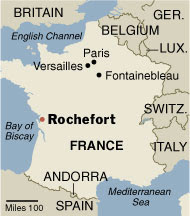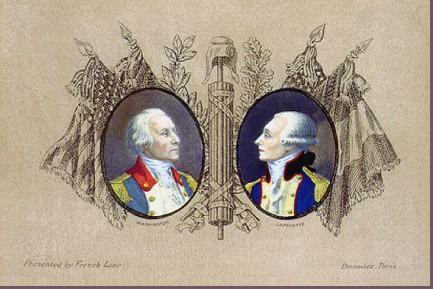
SECRETS OF A LIFELONG FRIENDSHIP
Washington and Lafayette established a lifelong friendship. In April 1777, LaFayette set sail to America after having bought a ship "La Victoire" and crossed the Atlantic with a dozen men. During the journey, he constantly was seasick and attempted to learn English, without much result. He dropped anchor in Charleston, South Carolina, two months later. LaFayette was tall, handsome, noble and rich and so much wanted to fight for the cause of the Insurgents. He applied to Congress which was in session, to be commisioned in the Continental Army. Gen. Washington himself had complained to Congress about the arrogance of French officers, and their inability to speak English, which had convinced Congress to stop granting military commissions to foreigners. However, when LaFayette offered to serve as a volunteer, and to pay all his own expenses and those of his men, Congress appointed him a Major General in the Continental Army. That was on July 31, 1777 and within days LaFayette met Washington. The two of them towered over their contemporaries physically, Lafayette was six-foot-two, Washington six-foot-three. From the moment they exchanged greetings, LaFayette was 19, Washington 45, a lifelong friendship began. Washington took an immediate liking to the wealthy young nobleman, who responded in a manner that was "appreciative and almost embarassingly affectionate" (Freeman). It was another thing however to figure out what to do with this boy volunteer. He was not yet in at the age of 20 but who hungered to lead American troops against the British, but who spoke only a few words of broken English, and had never heard a shot fired in anger. LaFayette is often described as Washington's adopted son and he frequently signed his letters with great flourishes of affection. Such a pushy French teenager would seem to have been the last thing Washington needed, and eventually the General was told that he was free to do as he liked with the impetuous marquis. How then to explain that before the month of August 1777 was out, LaFayette was living in Washington's house , in his very small circle of top military aides; that in a matter of weeks he was riding at Washington's side on parade; that by early September he was riding with Washington into battle; that after he was wounded at Brandywine he was attended by Washington's personal physician and watched over anxiously by the General himself? "Never during the American Revolution was there so speedy and complete a conquest of a heart of Washington" his biographer Douglas Southwell Freeman wrote. "How did LaFayette do it? History has no answer".
Actually LaFayette biographers have settled on one: that Washington saw in LaFayette the son he never had, and that LaFayette found in Washington his long-last father, a conclusion that, even if true, is so widely and briskly postulated as to suggest a wish to avoid a question. In any case, it is unsatisfying in several ways. For one, Washington rarely expressed regrets at not having a child of his own, and though he had many young military aides , he hardly treated them with fatherly tenderness. His adjutant Alexander Hamilton, who, like LaFayette had lost his father in infancy, found Washington so peremptory that he demanded to be reassigned.
Perhaps most discouraging to the father-son idea is that the relationship between Washington and LaFayette was not one of unalloyed affection. The elaborate 18-th century courtesies in their correspondence may be easily read as signs of warmth; they could also disguise the opposite. The two men differed on many things and are sometimes found to be working against each other in secret, each to his own ends. Their interaction reflects the always problematic relation between their countries, an alliance of which they were also the Founding Fathers.
LaFayette had become so moved by America's fight for independence that he gave his children the names George Washington and Virginia thus exemplifying his love for this country. There is a statue of Washington in Paris Place d'Iéna and one of LaFayette on Pensylvania Avenue across from the White House, in...LaFayette Park, Washington D.C.
His fine work for American Independence will never be forgotten and his name will always shine out on the pages of American History.
Like to know more? please read my article on: Direct Link: http://www.socyberty.com/La-Fayette-and-Washington-Why-Such-a-Lifelong-Friendship.168563
LES SECRETS D'UNE INDEFECTIBLE AMITIE
Washington et LaFayette entretinrent une amitié indéfectible. En Avril 1777, LaFayette prend la mer pour l'Amérique après avoir achété un navire "La Victoire" et traverse l'Atlantique avec une douzaine d'hommes. Tout au long du voyage, il a constamment le mal de mer et essaie d'apprendre l'anglais sans grand résultat. Il jette l'ancre à Charleston en Caroline du Sud, deux mois plus tard. LaFayette était grand, beau, noble et riche et désirait tellement se battre pour la cause des Insurgés. Il demande au Congrès, alors en session, à être engagé dans l'Armée Continentale. Le Général Washington, lui-même, s'était plaint au Congrès de la morgue des officiers français et de leur incapacité à parler l'anglais, ce qui amena le Congrès à cesser d'accorder des engagements militaires aux étrangers. Cependant, lorsque LaFayette offrit de servir comme volontaire et de payer pour toutes ses dépenses personnelles ainsi que celles de ses hommes, le Congrès le nomma Major General de l'Armée Continentale. Ceci se passait le 31 juillet 1777 et dans les jours qui suivirent LaFayette rencontra Washington. Les deux hommes dominaient par la taille leurs contemporains, tant ils étaient grands. A partir du moment où ils échangérent leurs salutations, LaFayette avait alors 19 ans et Washington en avait 45, une amitié vit le jour et allait durer toute leur vie. Washington se prit immédiatement d'affection pour le jeune noble fortuné, qui lui répondait d'une manière "élogieuse et presque affectueuse jusqu'à l'embarras" (Freeman). C'était autre chose cependant de s'imaginer ce qu'on allait faire de ce jeune volontaire. Il n'avait pas encore atteint l'âge de 20 ans qu'il brûlait de mener les troupes américaines contre les Anglais alors qu'il ne parlait que quelques mots de mauvais anglais et n'avait jamais entendu de coup de feu sur un champ de bataille. LaFayette est souvent décrit comme le fils adoptif de Washington et il terminait souvent ses lettres par de grandes marques d'amitié. Un si ambitieux jeune français semble bien avoir été la dernière des choses dont Washington avait besoin et en fin de compte le Général s'était entendu dire qu'il était libre de faire ce qu'il voulait avec l'impétueux marquis. Comment alors expliquer qu'avant la fin du mois d'août 1777, LaFayette vivait dans la maison de Washington parmi son cercle très privé d'aides de camp de haut rang; qu'en l'espace de quelques semaines il chevauchait aux côtés de Washington à la parade; que début septembre il chevauchait avec Washington jusqu'à la bataille; qu'après avoir été blessé à Brandywine, il fut soigné par le médecin personnel de Washington qui le veillait anxieusement? "Jamais au cours de la Guerre d'Indépendance il ne se trouva de conquête aussi rapide et totale du coeur de Washington" déclare son biographe Douglas Southwall Freeman. "Comment LaFayette y parvint-il? L'Histoire n'a pas la réponse". En réalité, les biographes de LaFayette sont tombés d'accord sur une version : que Washington a vu en LaFayette le fils qu'il n'a jamais eu, et que LaFayette a retrouvé en Washington ce père perdu il y a longtemps, une version que même si elle était vraie, fut tellement considérée comme admise avec un tel empressement qu'elle ressemble à un souhait émis afin d'éviter la question. En tout cas, cette version ne satisfait pas et sur plusieurs points. D'une part parce que Washington a rarement exprimé des regrets de ne pas avoir eu d'enfant, et bien qu'il ait de nombreux aides de camp très jeunes, il les a rarement traités avec une tendresse paternelle. Son adjudant major Alexander Hamilton, qui comme LaFayette avait perdu son père dans l'enfance, trouvait Washington si péremptoire qu'il demanda à changer d'affectation. Ce qui décourage peut-être le plus à l'idée d'une relation père-fils est que ce qui unissait Washington et LaFayette n'était pas que du bonheur parfait. Les politesses raffinées dans les correspondances du XVIIIème siècle peuvent facilement être traduites pour des marques d'affection; elles peuvent aussi déguiser le contraire. Les deux hommes s'opposaient sur un certain nombre de choses et on les trouve parfois en train de travailler l'un contre l'autre en secret, chacun à ses propres fins. Leur action mutuelle reflète les réactions toujours problématiques entre leurs pays dont ils furent les Pères Fondateurs de l'alliance. LaFayette avait été tellement emballé par l'idée de combattre pour l'indépendance de l'Amérique qu'il donna les noms de George Washington et Virginie à ses enfants démontrant ainsi son amour de ce pays.
Il y a une statue de Washington à Paris, Place d'Iéna et une de Lafayette sur Pensylvania Avenue juste en face de la Maison Blanche dans le... Square LaFayette, à Washington. Ses exploits exemplaires pour l'indépendance de l'Amérique ne seront jamais oubliés et son nom brillera pour toujours dans les pages des manuels d'Histoire de l'Amérique.
Vous souhaitez en savoir plus ? découvrez mon article sur: Lien Direct: http://www.socyberty.com/La-Fayette-and-Washington-Why-Such-a-Lifelong-frienship.168563



Aucun commentaire:
Enregistrer un commentaire